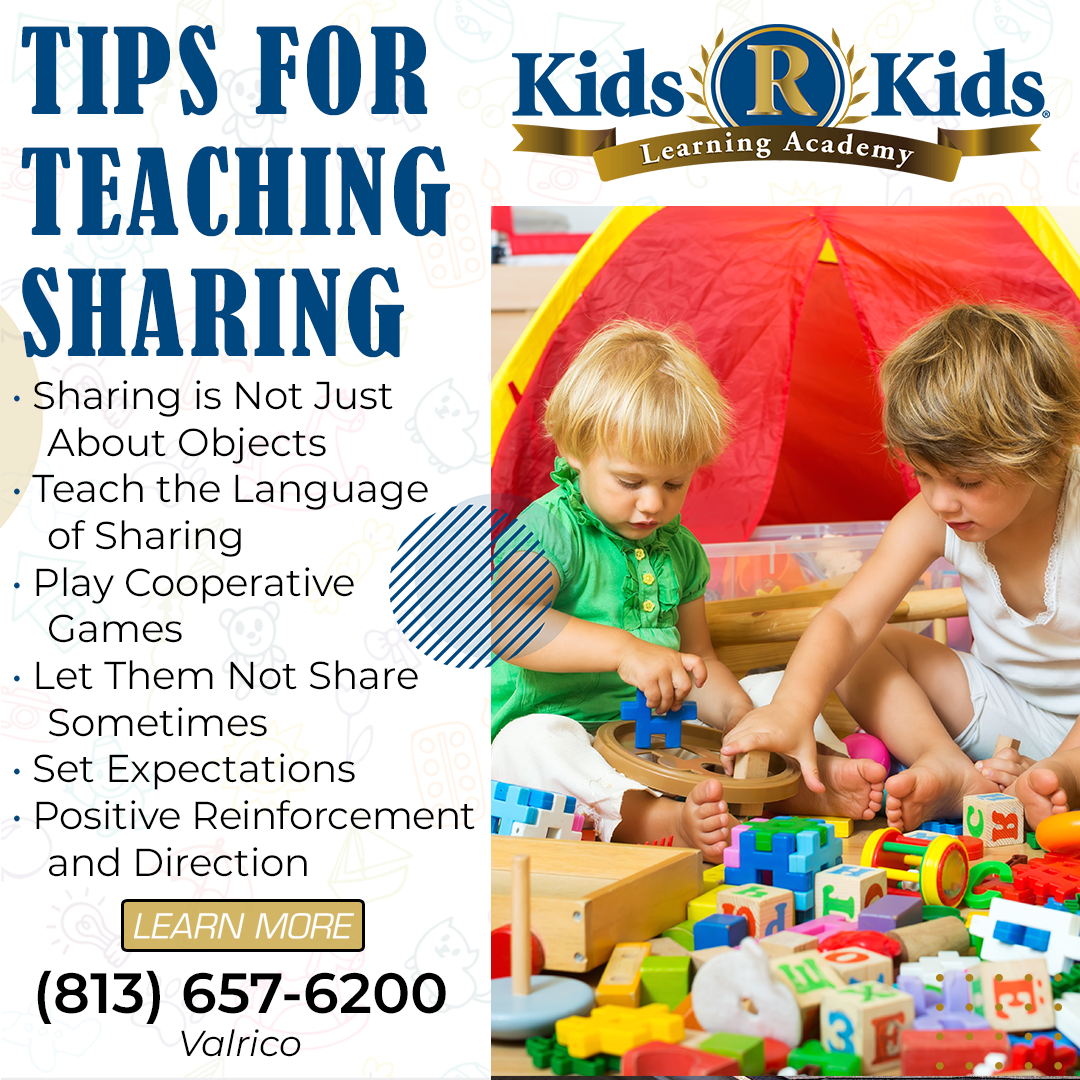Tips to build the habit of sharing
Every successful relationship, personal or professional is built on the foundations of cooperation, collaboration, and teamwork. Sharing time, money, or resources makes the world a kinder and happier place. This is a quality that must be built in the young generation at the earliest. Kids ‘R’ Kids, an educational preschool in Valrico, shares some tips on imbibing this wonderful quality of sharing in children.
.png)
Developmental Readiness for Sharing
The ability to share is directly related to empathy. Children are developmentally able to share only when they are cognitively able to understand another person’s point of view. Young children are naturally very egocentric. They have difficulty seeing anything outside their point of view. Studies show that during the ages of approximately 2 – 7 years old, children are slowly learning to understand that others have different thoughts, perspectives, and ideas than their own. Sharing will be vehemently resisted by this age group as they are only just beginning to understand other people’s points of view.
Like any developmental milestone, there is an age when children can be expected to share. And just like any other skill, sharing takes practice, time, and positive reinforcement.
Tips for Teaching Sharing
-
Sharing is Not Just About Objects
Sharing transcends objects. It is not just about sharing a favorite toy but also about sharing time and resources. A child who waits his turn to play is sharing his time and patiently waiting for the other child to finish his turn. A child who is investing time and energy to console a friend is sharing.
By modeling, this behavior at every opportunity adults can encourage children to share.
-
Teach the Language of Sharing
The developmental milestone of sharing may not have been achieved yet but the language of sharing can be taught and reiterated at an early age. Toddlers can be explained how a younger child needs more attention at one point and that they must wait their turn to receive the desired attention. Helping children assign words to their feelings while waiting for their turns can help. Praising the children for their ability to share can also give them the confidence to repeat the action.
-
Play Cooperative Games
Games that require children to cooperate and wait for their turns are a great setting to learn to share in. For instance, taking turns while playing a board game or putting together a puzzle allows children to practice sharing with others.
-
Let Them Not Share Sometimes
Children don't need to share everything, every time. A favorite toy could become a bone of contention and is, therefore, best kept away during playdates, for instance. It’s important to set up children for success by not forcing them to share something special with them. Giving them the liberty to choose to share their favorite toys may help them be more willing to share later.
-
Set Expectations
A heads-up on a possible situation where they may have to share allows children to process the information and be prepared. A simple explanation of the situation can go a long way. For instance, informing the kids that a family is coming over with two kids for dinner, and they all can play with their toys together. Also giving them an option of keeping away their favorite toys sets up the children for success during the social interaction and gives them the freedom of choice.
-
Positive Reinforcement and Direction
Positive reinforcement lies at the foundation of all learning. Therefore, children must be praised when they gracefully share their toys with their peers. On the other hand, escalating the situation and trying to force a child to share does not have a positive effect in the long run. Suggesting an activity that requires all children to work together such as play-doh or coloring may diffuse the pressure of sharing and give them the comfort of choice and liberty. They may feel comfortable eventually sharing and must be showered with praise for their efforts.
.png)
Why Kids ‘R’ Kids?
The philosophy of “Hug First, Then Teach”, defines every aspect of what Kids ‘R’ Kids, Valrico stands for. Unlike many daycare centers or childcare providers, its methodology is a whole-child approach. It constantly strives to strengthen and encourage every child’s emotional, intellectual, social, and physical well-being through the expertise of its childcare providers and a unique partnership with parents.
Kids ‘R’ Kids International is accredited by AdvancED®, the world’s largest education community, and the Southern Association of Colleges and Schools Council on Accreditation and School Improvement (SACS/CASI). SACS/CASI is an accreditation division of AdvancED®. This accreditation ensures that the high accreditation standards are met and exceeded.






















